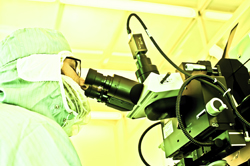Miniature functionalised biosensors
Bioreactors are designed to carry out industrially relevant biological reactions on a large scale. Nanobioreactors are very small-scale bioreactors that can functionalise nanomaterials to enhance reactivity and performance. EU-funded scientists working on the project 'On/off-switchable smart nanobioreactors' (SSNANO)(opens in new window) took the concept one step further. Scientists worked on developing thermo-responsive smart nanobioreactors for catalysis that turn on and off in response to environmental cues. A new class of stimuli-responsive nanomaterials was created, fabricated and incorporated into nanobioreactors. These reactors were characterised with numerous advanced microscopic and spectroscopic methodologies and prepared with simple and cost-effective processes. They turn on in response to an increase in temperature and switch off with temperature decrease unlike other negatively activated thermo-responsive nanobioreactors. This facilitated highly tunable catalytic activity and better control of the reactions. Scientists applied the self-switchable nanobioreactors as an electrochemical glucose biosensor with great success, demonstrating improved response kinetics and characteristics. Switching was rapid, responses were stable and the reactors demonstrated a long shelf life. The resulting package should be of great interest for medical, chemical, biological or environmental applications. SSNANO published the results in four well-respected peer-reviewed scientific journals and activities included establishment of The Chinese Advanced Materials Society(opens in new window) and The International Union of Advanced Materials(opens in new window) . Smart nanobioreactors for catalysis with improved performance characteristics should open the door to numerous applications in fields ranging from medicine to security to the environment. Their simple and cost-effective production methods should also render them attractive for rapid commercialisation.







